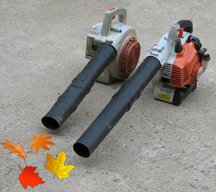 Following suggestions at a February 28 public forum, the Leaf Blower Study Committee has drafted amendments to its proposed bylaw such as expanded fall and spring periods when gas-powered machines can be used.
Following suggestions at a February 28 public forum, the Leaf Blower Study Committee has drafted amendments to its proposed bylaw such as expanded fall and spring periods when gas-powered machines can be used.
The group this week presented a revised draft to the Board of Selectmen that would add a couple of weeks in March and December, would also allow electric and battery-powered leaf blowers to be used year-round and would grant a grace period in the fall before the bylaw is enforced. “Additional changes are under consideration as well,” said committee chair Jamie Banks.
Under the original bylaw proposal, leaf blowers of any kind could not be used from December 16 through April 14. All types would be permitted during certain hours of the day in the fall and spring (October 1 through December 15, and April 15 through May 31). From June 1 to September 30, one electric or battery-powered leaf blower per lot could be used at a time.
The committee first proposed rules limiting leaf blower use in 2014 but “got shot down pretty substantially” after a public forum (the measure was ultimately passed over at Town Meeting that year), so “we went back to the drawing board” in terms of education around the issue, committee vice chair John Koenig said.
Over the past five years, the Rural Land Foundation (RLF), which owns the Lincoln Mall property, no longer allows its landscaping contractors to use gas-powered leaf blowers except during fall and spring cleanup, which is more or less in keeping with what the bylaw proposes. The same is true for workers on town-owned properties including cemeteries, roadsides, Bemis Hall, the library, the Lincoln School, and Pierce Park, said Dan Pereira, who handles the town mowing and maintenance contract in his capacity as director of the Parks and Recreation Department.
Some were skeptical when the change was first proposed, “but we really never looked back,” he said.
Under the bylaw, gas-powered machines could be used even at normally prohibited times for special events and circumstances with permission of the building inspector, committee members emphasized. Such situations could include clearing lawn debris after the recent wind storm, before a wedding on a resident’s property, or at the start of the academic year on the Lincoln School campus.
But some residents at the forum bristled at the idea of any limits on using their gas-powered leaf blowers. “A lot of people are trying to do the right thing” by buying hybrid vehicles and installing solar panels, “but instead you feel somehow compelled to take the extra step and ban it,” said Mark Deck. He suggested first instituting voluntary guidelines without penalties.
“I really believe you would make more headway with a carrot than a stick. I fear if you take the stick to Town Meeting, you’ll just get shot down again,” he said.
Committee chair Jamie Banks replied that the group, working with the Board of Health, sent letters with guidelines for responsible gas-powered leaf blower use, especially on paved surfaces in South Lincoln, “but it hasn’t worked” with property owners and managers except the RLF.
Part of the problem town-wide is that property owners often aren’t home when their lawn maintenance crews appear during the day with their machines. “People go to work and their contractors come in, so they’re not victimized by the noise they way their neighbors might be,” Banks said. “It’s very hard to build consensus on a problem that a lot of people aren’t exposed to.”
Lincoln’s rural character makes the bylaw impractical, said resident Cricket Kerrebrock. “The towns that have approved this are high-density towns, not two-acre zoning. It’s a density than virtually doesn’t exist in this town except around the mall.”
Resident Len Darling noted that he and others use their gas-powered leaf blowers in the summer to blow grass clippings off his patio, which would not be allowed under the proposed bylaw.
“What you’re saying is ‘go buy an electric one’,” Deck said.
Improved technology
However, electric and battery-powered leaf blowers have improved dramatically in recent years in terms of power, battery life and price, and are quite adequate for that sort of light-duty work, said George Carrette, owner of EcoQuiet Lawn Care in Concord, which uses only electric and manual tools to clear debris. The Conservation Commission also now uses only battery-powered chainsaws for trail maintenance, ConComm chair Peter von Mertens noted.
Electric leaf blowers have other advantages over the gas-powered versions: they last longer, require little or no maintenance, don’t require gasoline and oil, can use the same batteries as other machines such as chainsaws, and are easier to start, noted resident Alex Chatfield.
Restricting use of gas-powered leaf blowers to certain times of year for the sake of public health is comparable to restrictions on outdoor fires, he added. “Libertarian arguments have been around for decades to object to environmental laws. It would be great to live in a world where everyone is sensitive to the environment and impacts on their neighbors and don’t do stuff that’s harmful.”
“There are a lot of people who would like to see no leaf blowers ever, and at the other extreme, no regulation at all,” said committee member Robin Wilkerson. “Over five years we’ve tried to hammer something together that accommodates as many people as possible. We feel like this is a very liberal interpretation of what people can do.”
